Biolink NL
BBMRI-NL Rainbow Project 5
Biolink NL
BBMRI-NL Rainbow Project 5


News
--------------------------------
May 2016 :
End symposium BBMRI-NL phase 1
Date and location: Monday 30 May 2016, 9.30 - 16.00, LUMC Leiden.
We heartily invite you to BBMRI-NL’s symposium on Monday 30 May at lecture hall 4 of Leiden University Medical Centre, to mark the end of phase 1 and the official beginning of phase 2.
Why this meeting?
1 June 2016 sees the official end of phase 1 of the project Biobanking and Biomolecular Research Infrastructure The Netherlands (BBMRI-NL). During that first phase, BBMRI-NL has enforced and enriched the Dutch biobanking infrastructure by facilitating 100 small-scale Complementation projects, twelve large-scale Rainbow projects, and three ELSI projects.
Examples of the achievements reached in this phase are the Genome of the Netherlands project, the biobank catalogue, BIOS, Biolink NL, the MyBiobank portal and the Dutch National Tissue Portalbank (DNTP): hands-on tools for the day-to-day practice of biomedical researchers, biobank co-ordinators and bioinformaticians.
For details and registration for this symposium, go to www.bbmri.nl.
--------------------------------
September 2015 :
Final symposium BBMRI rainbow project Biolink NL
The project has closed on September the 15th with a very well attended symposium about record linkage in the Netherlands. You can review the presentations of this day through this link. In the past weeks, we have also published the final results in two open access papers on the websites of Biolink NL and of Statistics Netherlands (www.cbs.nl):
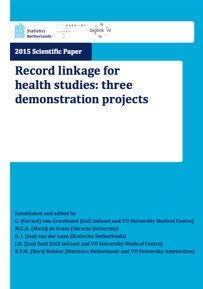
Record linkage for health studies: three demonstration projects
(Van Grootheest et al., 2015).
Summary in Dutch:
Het koppelen van gegevens wordt steeds gebruikelijker in statistisch en academisch onderzoek. Door informatie uit verschillende bronnen te combineren kunnen vragen beantwoord worden die met de gegevens uit één bron niet of zeer lastig te beantwoorden zijn. Het is belangrijk te begrijpen wat de technische, methodologische en juridische beperkingen van gegevenskoppeling zijn. Dit rapport beschrijft drie voorbeelden waarin medische en algemene gegevensbronnen gekoppeld zijn. Het is tot stand gekomen in het kader van het Biolink NL-project, één van de zogenaamde regenboogprojecten gefinancierd door de Biobanking and Biomolecular Research Infrastructure (BBMRI-NL). Het is een samenwerking tussen een aantal academische onderzoeksinstituten en het CBS. Dit is het tweede en laatste rapport dat de methodologische aspecten van het koppelen van bestanden onderzoekt binnen het Biolink NL-project.
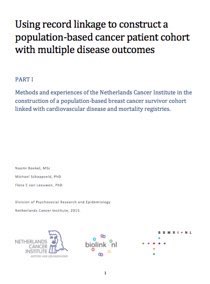
Using record linkage to create a population-based cancer patient cohort with multiple disease outcomes
(Boekel et al., 2015).
Summary in Dutch:
In het paper van Naomi Boekel et al. wordt beschreven hoe -- enkel door middel van gegevenskoppeling -- twee biomedische onderzoekscohorten konden worden samengesteld. Door gegevens te combineren uit landelijke databanken zoals de Nederlandse Kankerregistratie, het Pathologisch Landelijk Geautomatiseerd Archief (Palga) en het Bevolkingsonderzoek Borstkanker, werd het mogelijk om onderzoek te doen naar het ontstaan en het beloop van borstkanker. Het onderzoek is zodanig opgezet dat de onderzoekers geen identificerende gegevens van de betreffende patienten onder ogen hebben gehad.
--------------------------------
July 2015 :
Inschrijving symposium geopend
Datum: dinsdag 15 september 2015, 09.30 - 17.00 uur.
Locatie: Centraal Bureau voor de Statistiek, Henri Faasdreef 312, Den Haag.
Het programma voor het symposium over gegevenskoppeling is compleet en kunt u hier bekijken. De voertaal is Nederlands.
Tevens is de inschrijving vanaf heden geopend. Klik hier om u aan te melden (deelname is gratis).
--------------------------------
June 2015 :
Save the date!
Symposium BBMRI Regenboogproject Biolink NL: gegevenskoppeling in Nederland
Datum en locatie: dinsdag 15 september 2015, CBS Den Haag. Voertaal: Nederlands.
Inhoud
Met de wereldwijde opkomst van digitale registratiesystemen is het koppelen van gegevens (ook wel record linkage genoemd) sterk in opkomst. Door gegevens uit verschillende bronnen op het niveau van proefpersonen aan elkaar te koppelen worden in potentie onderzoeksgegevens heel efficiënt verkregen. Men dient daarbij rekening te houden met technische, methodologische en juridische aspecten. Belangrijke vragen in dezen zijn: onder welke voorwaarden mag er gekoppeld worden? Welke expertise is hiervoor nodig en hoe gaat dat in zijn werk? Op welke manier kan de kwaliteit van de koppeling worden beoordeeld?

Binnen het BBMRI Regenboogproject Biolink NL zijn de mogelijkheden van gegevenskoppeling onderzocht met betrekking tot wetenschappelijk onderzoek op het terrein van gezondheid. De nadruk van het project ligt op de praktische haalbaarheid en wetenschappelijke meerwaarde van gegevenskoppeling door cohortstudies en biobanken. Daarnaast zijn er de afgelopen periode enkele discussiebijeenkomsten georganiseerd met vertegenwoordigers van toetsingscommissies van diverse UMC’s en zorgregistraties, waarvan de uitkomsten hebben geleid tot het ontwikkelen van een ‘Koppelcode’.
Op het symposium zal door verschillende sprekers aandacht worden besteed aan de behoefte aan en de juridische mogelijkheden tot koppelen in Nederland. Daarnaast worden er onderzoeksresultaten gepresenteerd aan de hand van voorbeelden uit de Nederlandse praktijk. Tot slot is er ruimte voor discussie over de toekomst van gegevenskoppeling in het wetenschappelijk onderzoek. Het aantal deelnemers voor deze dag is beperkt tot 100, dus wees er tijdig bij en geef u op!
Doelgroep
Het symposium is gericht op onderzoekers die te maken hebben met, of geïnteresseerd zijn in het koppelen van gegevens van deelnemers of proefpersonen in wetenschappelijk onderzoek. Daarnaast is de materie interessant voor functionarissen gegevensbescherming en privacy-juristen die werkzaam zijn bij onderzoeksinstellingen of databanken.
foto: CBS.
--------------------------------
December 2014 :
Project update
As the BBMRI rainbow project Biolink NL is reaching its final stage, a short status update has been presented in this newsletter. Here we provide a summary. An inventory among Dutch biobanks at the start of the project has confirmed that many research groups would like to see clear legal and technical guidelines for record linkage.
Catalogue
Together with rainbow project Catalogue 2.0 we are creating a catalogue of biobanks and registries that can be linked at a low level. This means that it becomes possible to accurately estimate the overlap between existing data sources, without compromising individuals’ privacy in any way. The groups that cooperate in this proof-of-concept project include biobanks such as LifeLines, NESDA, PIAMA, KOALA and the ABCD cohort.
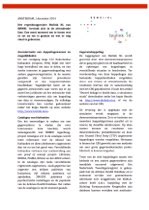
Record linkage
The backbone of Biolink NL consists of three demonstration projects in which various linkage methods are compared in different situations. Two linkages between a biobank and a registry have been successfully completed. The Netherlands Twin Register was linked with the Achmea Health Database and was thus enriched with information about health care consumption. The KOALA cohort has retrieved detailed information on drug dispense through linkage with the SFK database of pharmacies. The third and most complex demonstration project is the linkage between the OMEGA cohort and the Dutch Cancer Registry, which will be carried out in the coming weeks. Together with Statistics Netherlands we have worked on methods to probabilistically link very large datasets.
Legal issues
Two expert meetings have been organised at which the ethical, legal and social issues of record linkage were discussed. Detailed information on the legal aspects of record linkage in biomedical research can be found on the website http://www.bbmri-wp4.eu/wiki/index.php/Netherlands.
Symposium
Biolink NL and Statistics Netherlands are organising a symposium around record linkage in 2015. On this symposium, the results will be presented and the potential of record linkage in the Netherlands will be discussed. Check this website soon for more details.
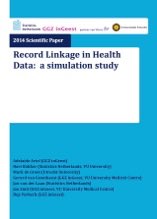
June 2014:
Simulation study published
We conducted a literature review and a simulation study on record linkage. The results from this simulation and review were published as a freely accessible white paper in collaboration with Statistics Netherlands.
Download Record linkage in health data: a simulation study (Ariel et al., 2014).
--------------------------------
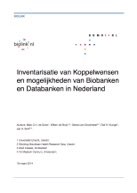
March 2014:
Record linkage in Dutch research cohorts
We queried Dutch biobanks about a number of linkage-related topics and report the results in this paper. These include researchers’ experience with record linkage and the wish to use record linkage techniques to enrich their data collections in the future. Special attention is paid to the technical and legal possibilities to perform record linkage in these cohort studies.
Download Biolink inventarisatie (Nederlands) (De Groot et al., 2014).
--------------------------------
June 2012:
A national infrastructure for linkage of biobanks to medical and socioeconomic registries

Biobanks often rely on and could be greatly enriched by linkage with external registries or databases for assessment of exposures and/or long-term follow-up of health outcomes. In the Netherlands, many high-quality medical and socioeconomic registries are available that are of interest for linkage with biobanks.
Record-linkages are currently performed ‘ad-hoc’ for each project or biobank individually. This means that each time a new biobank or registry has to be linked all technical, administrative/privacy issues have to be dealt with again. This approach is clearly not efficient. Furthermore, the validity of a certain linkage is often not assessed or is assessed just once and not repeatedly after for instance implementation of a new linkage algorithm or linkage of different base populations.
Photo: prof. dr. J.H. Smit and prof. dr. O.H. Klungel.
Biolink NL aims to improve the efficiency and quality of linkage between biomedical and socioeconomic registries, in conformity with statutory and consent obligations to participants. In addition, a national infrastructure will be set up to facilitate routine application of the methods and at the same time, to protect the privacy of the subjects. We wish to obtain a higher number of linkages with excellent quality, in order to stimulate scientific medical research.
Biolink NL is a rainbow project financed by BBMRI-NL. Rainbow projects are large scale projects that aim to improve the research infrastructure for Dutch biobanks. The rainbow projects focus on the harmonization and enrichment of biobanks in the Netherlands. BBMRI-NL has initiated ten rainbow projects in 2010 en 2011.
